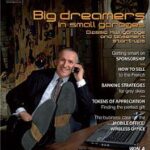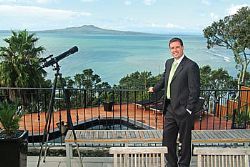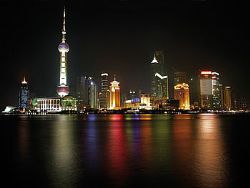Time for cool heads
Expect some change, but not catastrophic change: Kevin Kevany reports on the prospects for exports in the post sub-prime world, and there’s advice from the experts for new exporters.
Have we reached, in what is this year’s fashion-phrase: “the tipping point”? Or is this the beginning of a very tough period – particularly for SME exporters? The only thing we can be sure of is that the ingenuity, innovation and risk-taking ability of Kiwi entrepreneurs is going to be tested in the next 12 months as never before. As we go to press, our dollar is showing the first signs of softening across the board, for the first time in ages, driven by a strengthening in the US-dollar primarily, and predicted by the experts to keep tumbling. So it should be the ‘nirvana’ we have all been waiting for, given the fact that the New Zealand dollar’s 20-year highs were seen as a major burden on exporters through the period. Unfortunately with every ‘ying’, there is a ‘yang’. The global credit crisis, particularly in our traditional US/UK/EU export markets, looms large, with the dreaded “recession” and “stagflation”, even “depression” words being tossed around. The role of speculators in the oil and food markets, in particular, is a new phenomenon, not previously encountered. The latest business operations survey put out by the Department of Statistics in late April, showed one-in-five businesses generated some form of overseas income. Nearly half of those exporting earned foreign money from finished goods (largely bigger companies); while an encouraging 40 percent of offshore income is now in services. Exchange rate volatility and the consistently high local dollar were the top reasons given for staying home. Despite that, a recent survey by DHL shows only a third of local companies surveyed are involved in currency hedging activities. Participants claimed to understand all the machinations of that option, yet relatively few got their toes wet. “The survey results are surprising given the importance exporters attribute to the exchange rate impacting their business,” says DHL Express general manager, Derek Anderson. Twenty one percent of the companies surveyed, using hedging, have fewer than five employees. “SMEs are not too small to be involved in currency hedging,” says Anderson. “In fact, given these uncertain times with the volatile Kiwi dollar, more companies should consider it.” Bob Walters, CEO of Export New Zealand believes there is now more to the changing export environment than currency and hedging, as important a factor as that is. He sees an upside in export markets for companies which “know their business; and how and where they fit”. “Local SMEs, because of their relative size and scale in global markets, plus the distance of New Zealand from global markets, ought to have a very tight focus and niche into whichever market they have decided they want to operate. One would also hope that each has some depth and spread of risk there too, providing something of a cushion as they adapt.” High-in-the-pie Flexibility and adaptability, “being high-in-the-pie” and “delivering value-added” are going to be even more important going forward. Bob Walters again: “Trelise Cooper is cautioning that even the top-end of the US market is easing up, making this a different environment to what we have seen before.” Walters predicts “some change, but not catastrophic change” in the global market, with “Australia, the EU and parts of Asia all still going well”. Constant monitoring of your current niche and how customers are being impacted, along with cautious and thorough investigation of new opportunities, should be the order of the (new) day. Companies and individuals deciding this is a good time to sit on the export “sidelines” (i.e. concentrate on the important local market) could use the time to hone skills for more stable times – assuming they are just around the corner. Be proactive The recently-opened, Palmerston North-based, distance learning New Zealand School of Export bridges the academic and business divide, filling the gap between topical workshops and tertiary qualifications. It provides the accredited Diploma of International Trade, which leads to the Certified International Trade Professional (CITP) designation. The first course started in February and the next is scheduled for July. Philippines trained psychologist-turned-international-trade-professional, Belinda Andal, one of the first intake, who will shortly complete the diploma, is on track to become one of the country’s first CITPs. NZBusiness asked her what she had learnt which she could share with readers. “Get to know your clients – they are not numbers, they are people and remember that the realities in one market are not likely to be universal – do your homework and get it right.” Above all, her advice is to be proactive – don’t wait for opportunities – go out and find them and as the international landscape is dynamic, always research, plan, execute and seek continual improvements. Forging new markets Not averse to being proactive is Senztek, one of New Zealand’s new breed of export-focused technology companies. Formerly SolaStat Limited, it dominated (nearly 80 percent) the New Zealand solar heated hot water controller market. Now, using the reputation SolaStat earned as a strong energy product brand name as a platform, it is moving proactively and creatively to bring its comprehensive range of intelligent measurement technology products both to New Zealand and to selected niches around the world. In just a short period, management has had to rename and reposition the company as being in the ‘energy measurement and management’ business, rather than solar. And in dealing with that virtual somersault, they have found new markets opening up to them in some unlikely places – such as measuring and controlling ground-heated power in Hungary, a “lateral market too insignificant for the dominant German companies”. Senztek has “rethought, researched and repackaged” its business so thoroughly that it is confident of being able to match the company’s offering to very diverse markets – without compromising its products’ or its own integrity. If that sounds too complicated to contemplate, here’s how and why they have gone through this process. “Understanding what it is a company actually does and is good at doing is, I believe, the first step towards success. Once these things are understood; then plans and strategies can be put in place to support growth into new markets and develop new opportunities,” says Brian Knolles, managing director of Senztek. As a consequence, today, wherever there is a hot water cylinder, in a domestic, commercial or industrial situation, Senztek now has a potential customer. The dairy, wine-making, kiwifruit and various other processing industries are already local users. SolaStat (the brand name has been retained for solar-heated water controllers, pumps, software and accessories) was launched in October 2006 to purchase ICM Limited, a 15 year-old company manufacturing industrial control and measurement products. Industry bodies, such as NZ Trade and Enterprise (NZTE), provided grants, allowing the company to continue its export-focused strategy. The company’s strong bonds with suppliers has also been hugely beneficial – some of whom have been a source of leads, good market knowledge and industry advice. “The best bit of advice I ever listened to was to go seek the assistance of smart people to help you get the job done,” says Knolles. One of those ‘smart people’ was Cambridge-educated engineer and linguist, Simon Fawkes, who has been contracted to guide the firm’s international marketing. Fawkes’s fluency in German was an added factor in a marketing trip to attend the Intersolar trade fair, the world’s largest solar-thermal event, held in Freiburg, Germany. (See sidebar for Fawke’s strong belief in the effectiveness of exhibitions.) A partnership between the Foundation for Research Science and Technology (FoRST) and NZTE, in conjunction with the Auckland University MBA programme, led to two final year MBA students working closely with Senztek to identify other opportunities for export markets. Hungary (ground heat) and Spain (solar heated pools) are two further lateral markets to be assessed, along with progressing the UK opportunities. An agency agreement with a UK representative, contracting him for one day every week, provides Senztek with a physical presence in that country. Senztek (the “nz” in Senztek was not a deliberate device, since it can be a mixed blessing abroad) is a partnership between Kevin Murphy, production; Lance Allen, technical; and Brian Knolles. Murphy and Allen are both ex-ICM employees (15 years and five years respectively), while Knolles has some 25 years of experience in Telecom management – and latterly growing a New Zealand software company with strong export markets. The helter-skelter rush to use new energy-saving technologies, particularly in “smart” homes, has coincided with the company’s bold offshore thrust. “Save energy” has become the clarion cry of governments globally too. Turn off the lights Knolles is bemused by the call for “shorter showers and turning off the lights”. “It’s like they want to punish us. Install our AlphaStat–Plus 1 intelligent hot water controller –effectively an intelligent thermostat – and just get on with your life instead. An EECA (Energy Efficiency Conservation Authority) rating, using Trynsis modelling, shows that its installed retail price will be recovered in two to three years, at an average saving of $200 a year.” Senztek’s timing could not have been better. But it hasn’t all been plain-sailing. “We have learnt not to take anything for granted. Never assume that two markets are ‘the same’,” says Knolles. “You might think that Australia and the US are the same when it comes to hot water storage. No such luck: on average, our neighbours are warmer and therefore want the tank outside, while the Americans want it indoors, to warm the house. “Similarly, switches which were good enough for the boiler-room now have to be re-designed to go on a living room wall where they can be more easily monitored,” says Knolles. The Hungarian experience and, he suspects, the Spanish one will prove too that if you want a niche below the radar of the powerful English-speaking global companies, you have to explore strategic and researched opportunities in truly foreign lands, albeit with language, legal and other “unfamiliarity”. Knolles is passionate about “good people”, although they are barely into double figures with around a dozen employees; and “networks”. “We grow our network daily. That takes effort, but we have an international one now, including our professional service providers, consultants, contractors, employees, customers, agents, academics, even cabinet ministers, friends and families. All contribute and play a part.” Websites to visit: www.senztek.com www.export.ac.nz [email protected] www.dhl.co.nz www.theicehouse.co.nz www.exportnewzealand.org.nz Kevin Kevany is an Auckland-based freelance writer. Email [email protected]





